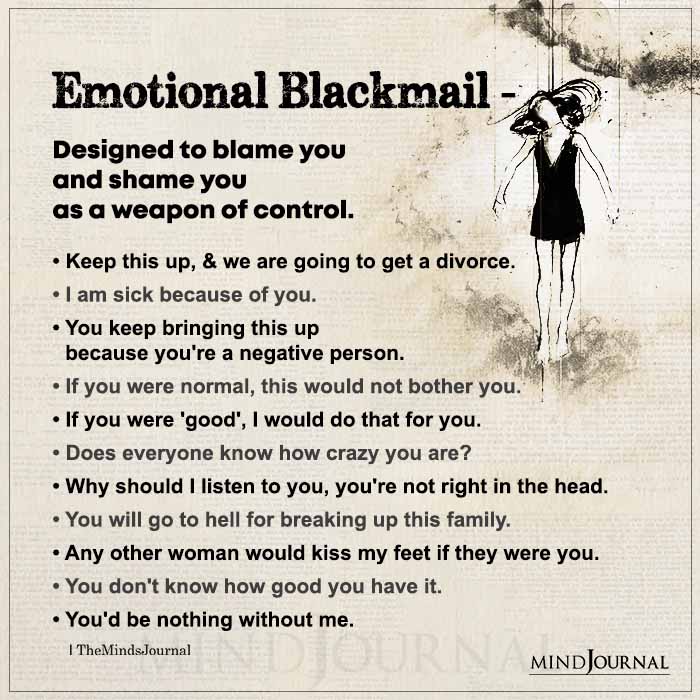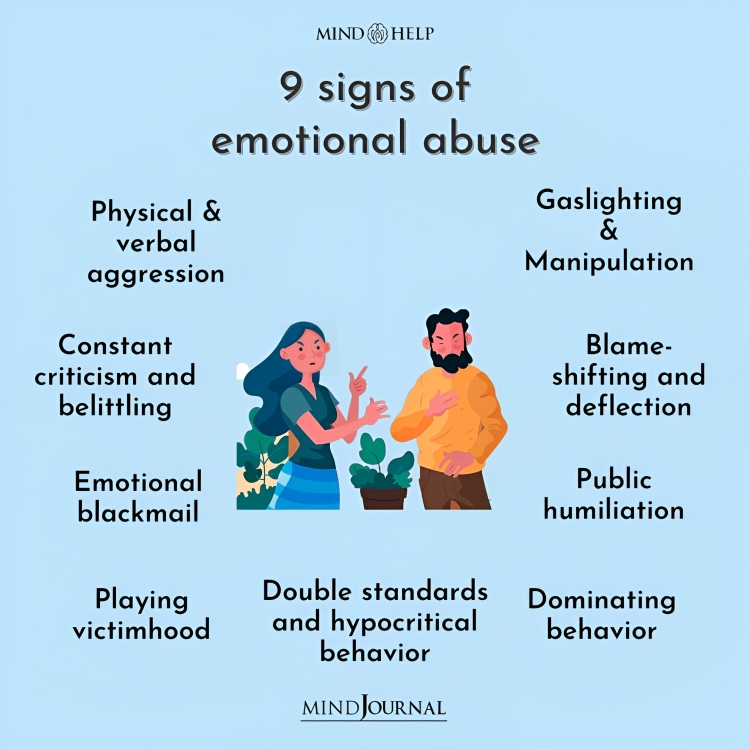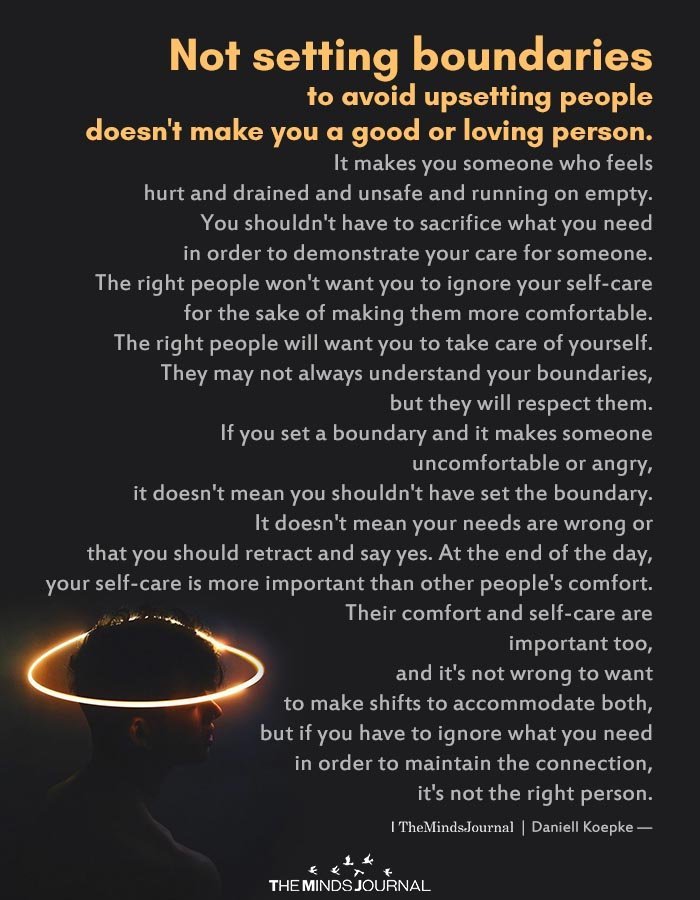Picture this: You’re sitting across from a friend, engrossed in conversation, when suddenly you feel the atmosphere change. Their tone becomes harsh, their eyes seem accusatory, and it feels like you’re trapped in an emotional minefield. Now, that’s what is emotional blackmail.
We’ve all experienced it at some point in our lives, whether it’s a toxic relationship, a manipulative friend, or even within our own families. But what is emotional blackmail exactly, and how to deal with emotional blackmail?
In this article, we are going to take a look into the world of emotional blackmail and try to understand each and every nuance. We will talk about the signs of emotional blackmail, the types of emotional blackmail and how to deal with emotional blackmail.
So, are you ready to do this?
Related: Emotional Blackmail and Its 7 Signs
What Is Emotional Blackmail?
It’s like when someone pulls a sneaky mind game on you to get their way. They’ll guilt-trip you, threaten you to do what they want or even put the burden of their happiness on you. It’s all about manipulating you and your emotions, so that it’s easier to control you.
For example, your husband might threaten you with a divorce if you don’t do exactly what he expects from you. Or if you are in an abusive relationship, and you tell your girlfriend that you want to break up, she says that she will kill herself if you leave her.
That’s emotional blackmail in action, and it’s really not cool, because nobody deserves to be treated like that.

Okay, now that we know what is emotional blackmail, let’s talk about the types of emotional blackmail, shall we? Yes, there are different types of emotional blackmail, in case you didn’t know!
Types Of Emotional Blackmail
- The Guilt Trip: This classic move involves making you feel guilty for not meeting the blackmailer’s expectations or desires. They may use phrases like, “After everything I’ve done for you, this is how you treat me/repay me…”
- The Silent Treatment: When someone acts detached and aloof or gives you the cold shoulder as a form of punishment or control, it’s a clear case of silent treatment and one of the worst types of emotional blackmail.
- The Victim Card: Playing the victim card means twisting situations to make themselves appear helpless or as if they are unfairly treated. They use sympathy and pity to manipulate others into doing their bidding.
- Threats and Ultimatums: One of the most dangerous types of emotional blackmail, this involves giving threats or ultimatums to force you into complying. For instance, “If you don’t marry me, I will commit suicide”.
- Manipulative Flattery: They may shower with a lot of affection, compliments and gifts to make you feel indebted to them, so that they can control you even more.
- Gaslighting: This is a psychological tactic where the blackmailer tries to distort your sense of reality and makes you question your own perceptions, sanity and emotions. Basically, denying and twisting events to make you question your version of the truth.
- Withholding Affection: One of the most painful types of emotional blackmail, withholding love, attention, or intimacy, aims to make you feel unlovable and unworthy, so that you are forced to abide by their demands to regain their love and affection.
- Public Shaming: This form of blackmail involves humiliating you or embarrassing you in public, either indirectly or directly, so that you give into their demands out of humiliation and fear.
Related: Toxic Friend Alert: 10 Warning Signs Of An Emotionally Draining Friendship
Now that we know the different types of emotional blackmail, let’s talk about the signs of emotional blackmail.
7 Signs Of Emotional Blackmail
1. You tread on eggshells around them.
Often, you might agree to their unreasonable demands because you’re scared of causing fights or arguments in the relationship. You try to keep them happy by agreeing with them on everything, and never say ‘no’ to them.
You pick your words carefully to avoid any fights, and this usually stems from a deep fear. You always feel scared and anxious when they’re around.
2. They threaten to destroy things that are valuable to you.
One of the major signs of emotional blackmail is this. They gradually learn about your fears, and weaknesses and then use them against you.
They might threaten to harm your prized possessions or ruin relationships with the people you love. Often, they use the threat of leaving to keep you from confronting them about their actions.
3. They have a very black-and-white sort of a mindset.
What is emotional blackmail? Most people can find a middle ground on issues. However, those who use emotional blackmail see things in strictly black and white terms; you’re either with them or against them.
They insist that if you don’t meet their often unreasonable demands, it shows that you dislike them and are trying to upset them. This manipulation tactic is a powerful one, especially during tense situations where you might agree just to avoid conflict.

4. They threaten to create a scene in public.
Emotional blackmailers are experts at being drama kings and queens, and they’re highly skilled at creating tension. When you are in a public setting with them, and you don’t agree to do something, they react by threatening to embarrass you in front of others.
And you end up doing exactly what they want so as not to create a scene in public. One of the most horrible signs of emotional blackmail, it aims at humiliating you.
Related: How To Spot Manipulation? Your Guide to Spotting and Stopping It
5. They always play the victim.
What is emotional blackmail? A key indicator of an emotional blackmailer is their constant portrayal as the victim. They manipulate situations, and if you’re correct and justified during a disagreement, they might behave as if they are unfairly treated.
They often adopt a victim mentality, which may lead you to feel guilty. You might end up saying sorry to mend things, even when you are not at fault.
6. They pressure you until you comply with their desires.
If you are in a relationship with an emotional blackmailer, you will notice that they put extreme pressure on you to do their bidding. They can use anger or tears to manipulate you into doing what they want.
Their style of intimidating is different in different situations. These might include endless tears and drama or even physical aggression. They’ll leave no stone unturned to coerce you into doing what they want.
7. They threaten to harm themselves if you don’t listen to them.
One of the worst signs of emotional blackmail is this one right here – they threaten to severely harm themselves if you do something they don’t want you to do. For example, if you want to breakup with your manipulative partner, they might threaten self-harm to stop you from leaving them.
This tactic is designed to instill fear in you, compelling you to comply with their demands out of worry for their safety. Often, this fear drives the victim back into the blackmailer’s control to prevent any harm.
How To Deal With Emotional Blackmail?
1. Try to understand what’s happening, and see it for what it is.
If you think you’re being emotionally blackmailed, begin by observing the dynamics of your relationship more closely. To address a problem effectively, you need to first understand what you’re facing.
However, be cautious and don’t falsely accuse your partner of emotionally blackmailing you, when all they’re doing is setting boundaries or expressing their needs. Real emotional blackmail involves manipulation, threats and excessive pressure.
2. Walk away or ignore their tantrums and tears.
If you want to make a clear statement, leave the scene the moment they start throwing tantrums and have emotional outbursts. They do this to manipulate you into complying with their demands.
This might seem harsh or cold, but it’s an effective method to show your emotionally abusive partner that they cannot exploit your kindness to achieve their desires.
Related: 25 Signs of A Controlling Parent And How To Cope With Them
3. Make sure you have strong boundaries.
How to deal with emotional blackmail? Set strong, strict personal boundaries. You cannot address emotional blackmail in a marriage or relationship without setting clear and firm boundaries that uphold your independence. This action is vital for combating mental abuse and manipulation.
Inform your partner decisively that you will not accept them yelling at you, speaking ill of your family and friends, or threatening physical harm. These actions show that you are not scared of them and you are willing you protect your mental health and overall wellbeing.

4. Think about getting therapy.
Seeing a therapist could help you figure out the reasons behind your choices, understand the signs of emotional blackmail, and help you make decisions more practically.
If you are wondering how to deal with emotional blackmail, then you should know that therapists can guide you in reshaping your beliefs around what you deserve and aid you in building healthier relationships.
Making such significant changes is tough, but support from a professional can simplify the process.
5. Leave if everything starts to feel too much.
An emotional blackmailer often learns to meet their needs through these means from an early age. If they are open to it, they can learn how to be responsible, communicate better, and manage both your needs and theirs.
However, if they refuse to change, and keep on trying to exploit you for their selfish gains, then you should think about leaving the relationship for good and moving on.
Takeaway
Knowing what is emotional blackmail can really help you see things as the way they are. Now you don’t have to wonder anymore if you are crazy or insensitive – you were being emotionally blackmailed.
You deserve people in your life who give you the space you need, support you and give you the respect you deserve. Anything other than that is simply unacceptable.
Related: 5 Types Of Psychological Manipulation And How To Deal With Them
Have you ever noticed any of these signs of emotional blackmail in the people close to you? How to deal with emotional blackmail, according to you? Let us know in the comments down below!









Leave a Reply
You must be logged in to post a comment.